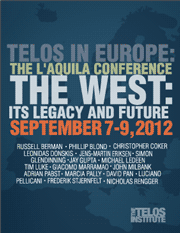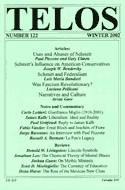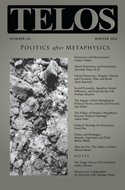By Julio Alcántara · Wednesday, February 27, 2013 The following paper was presented at Telos in Europe: The L’Aquila Conference, held on September 7-9, 2012, in L’Aquila, Italy.
 When we ask, once again, about the sense and origin of the West, we are led to a spatial relation of meaning that humans have with the world and with themselves. The essence of this act is based on the fundamental values of this era, which define the borderlines of the present’s symbolic extension: the human being, as a spatial-being, is also temporal. In fact, spatial differences are not more that multiple fields of temporal states of being. In short, what brings us together today is the polemic signification of the space-time limit of the occidental man and, as such, of the factual possibility of being in the world. When we ask, once again, about the sense and origin of the West, we are led to a spatial relation of meaning that humans have with the world and with themselves. The essence of this act is based on the fundamental values of this era, which define the borderlines of the present’s symbolic extension: the human being, as a spatial-being, is also temporal. In fact, spatial differences are not more that multiple fields of temporal states of being. In short, what brings us together today is the polemic signification of the space-time limit of the occidental man and, as such, of the factual possibility of being in the world.
Continue reading →
By Maja Sidzinska · Tuesday, February 26, 2013 As an occasional feature on TELOSscope, we highlight a past Telos article whose critical insights continue to illuminate our thinking and challenge our assumptions. Today, Maja Sidzinska looks at James Kalb’s “Liberalism: Ideal and Reality,” from Telos 122 (Winter 2002).
 James Kalb bluntly asks us: “Why does liberalism—the tradition that makes equal freedom the political touchstone—combine such strength with such incoherence? . . . Liberalism is triumphant almost everywhere, but its victory reverses the meaning of its principles. It calls for live-and-let-live, and enforces it by supervising everything” (111). Kalb explores the inherent tension between what he regards as the two core principles of liberalism—freedom and equality. Here, freedom is interpreted as the potential or ability to carry out one’s will, while equality is understood as the principle that ensures the right of each individual to do so. But what happens when two individuals’ wills are in conflict? Logically, liberalism has few intrinsic means to resolve such a scenario, argues Kalb. It simply “resolves disputes by letting each do as he likes consistent with the equal freedom of others, and in case of conflict the more tolerant wins” (117). In this case, “more tolerant” appears to refer to that stance which is less intrusive on the will, person, or property of another. James Kalb bluntly asks us: “Why does liberalism—the tradition that makes equal freedom the political touchstone—combine such strength with such incoherence? . . . Liberalism is triumphant almost everywhere, but its victory reverses the meaning of its principles. It calls for live-and-let-live, and enforces it by supervising everything” (111). Kalb explores the inherent tension between what he regards as the two core principles of liberalism—freedom and equality. Here, freedom is interpreted as the potential or ability to carry out one’s will, while equality is understood as the principle that ensures the right of each individual to do so. But what happens when two individuals’ wills are in conflict? Logically, liberalism has few intrinsic means to resolve such a scenario, argues Kalb. It simply “resolves disputes by letting each do as he likes consistent with the equal freedom of others, and in case of conflict the more tolerant wins” (117). In this case, “more tolerant” appears to refer to that stance which is less intrusive on the will, person, or property of another.
Continue reading →
By Telos Press · Monday, February 25, 2013 Telos has always been about big ideas. Populism. Federalism. Traditions. The intersection of politics and religion. The legacy of totalitarianism and the ongoing threat of terrorism. Over the years we’ve dedicated special issues to these and other topics in order to give them the wider critical attention they deserve.
In the spirit of big ideas, we’re offering a 20% discount on select special issues of Telos from today through the end of March. There’s no better time than now to explore our rich history of critical engagement with the pivotal concerns of politics and philosophy.
Browse the back issues of Telos here. Note: Articles from out-of-stock special issues are available in digital form at the Telos Online website.
Continue reading →
By Michael Marder · Wednesday, February 13, 2013 Michael Marder’s “After the Fire: The Politics of Ashes” appears in Telos 161 (Winter 2012). Read the full version online at the Telos Online website, or purchase a print copy of the issue in our store.
 Two fires are kindled at the threshold of the metaphysical era, and both are extinguished, almost simultaneously, as soon as metaphysics exhausts itself (or else gets exhausted, tired, fatigued with itself) in its final Nietzschean inversion. The political reality of the twenty-first century is, as a whole, a comet tail of these ancient blazes that, until recently, seemed to be older than time itself, gave the impression of being eternal, undying, inextinguishable. How to find one’s bearings among the cinders and ashes of what the flames consumed? How to make sense—if make sense we must—of the burnt and smoldering remains, the traces of catastrophes, as much as of hopes and revolutionary desires, littering the horizons of the political today? Two fires are kindled at the threshold of the metaphysical era, and both are extinguished, almost simultaneously, as soon as metaphysics exhausts itself (or else gets exhausted, tired, fatigued with itself) in its final Nietzschean inversion. The political reality of the twenty-first century is, as a whole, a comet tail of these ancient blazes that, until recently, seemed to be older than time itself, gave the impression of being eternal, undying, inextinguishable. How to find one’s bearings among the cinders and ashes of what the flames consumed? How to make sense—if make sense we must—of the burnt and smoldering remains, the traces of catastrophes, as much as of hopes and revolutionary desires, littering the horizons of the political today?
Continue reading →
By Adrian Pabst · Tuesday, February 12, 2013 Pope Benedict XVI’s resignation was certainly sudden but not altogether unexpected. During the pontificate of his predecessor, the then Cardinal Ratzinger seems to have advised the long-suffering Pope John Paul II to renounce the Petrine office. Crucially, in mid-2010 Benedict gave a strong indication that he was considering abdicating. On April 29, 2009, he left his pallium—the sign of Episcopal authority—on the tomb of Pope Celestine V in the Basilica Santa Maria di Collemaggio, in L’Aquila. In the same location Celestine had been crowned pontiff on August 29, 1294—an event that is commemorated as the festival of Perdonanza Celestinana in the earthquake-stricken city every August 28–29. It is unlikely that Benedict’s highly symbolic gesture was a random act. Clearly he felt a deep spiritual connection with the studious monk-pope Celestine, who abdicated in 1295.
Continue reading →
By Greg Melleuish · Monday, February 11, 2013 The following paper was presented at Telos in Europe: The L’Aquila Conference, held on September 7-9, 2012, in L’Aquila, Italy.
 We live in an age of History Wars. We live in an age of History Wars.
Most of them are national in focus.
There is, however, one that touches on the issue of Western civilization, and that is the perceived conflict between Western civilization and world history.
Advocates of world history castigate Western civilization for pretending to be universal when, in fact, it is partial and prejudiced.
Continue reading →
|
|
 When we ask, once again, about the sense and origin of the West, we are led to a spatial relation of meaning that humans have with the world and with themselves. The essence of this act is based on the fundamental values of this era, which define the borderlines of the present’s symbolic extension: the human being, as a spatial-being, is also temporal. In fact, spatial differences are not more that multiple fields of temporal states of being. In short, what brings us together today is the polemic signification of the space-time limit of the occidental man and, as such, of the factual possibility of being in the world.
When we ask, once again, about the sense and origin of the West, we are led to a spatial relation of meaning that humans have with the world and with themselves. The essence of this act is based on the fundamental values of this era, which define the borderlines of the present’s symbolic extension: the human being, as a spatial-being, is also temporal. In fact, spatial differences are not more that multiple fields of temporal states of being. In short, what brings us together today is the polemic signification of the space-time limit of the occidental man and, as such, of the factual possibility of being in the world.  James Kalb bluntly asks us: “Why does liberalism—the tradition that makes equal freedom the political touchstone—combine such strength with such incoherence? . . . Liberalism is triumphant almost everywhere, but its victory reverses the meaning of its principles. It calls for live-and-let-live, and enforces it by supervising everything” (111). Kalb explores the inherent tension between what he regards as the two core principles of liberalism—freedom and equality. Here, freedom is interpreted as the potential or ability to carry out one’s will, while equality is understood as the principle that ensures the right of each individual to do so. But what happens when two individuals’ wills are in conflict? Logically, liberalism has few intrinsic means to resolve such a scenario, argues Kalb. It simply “resolves disputes by letting each do as he likes consistent with the equal freedom of others, and in case of conflict the more tolerant wins” (117). In this case, “more tolerant” appears to refer to that stance which is less intrusive on the will, person, or property of another.
James Kalb bluntly asks us: “Why does liberalism—the tradition that makes equal freedom the political touchstone—combine such strength with such incoherence? . . . Liberalism is triumphant almost everywhere, but its victory reverses the meaning of its principles. It calls for live-and-let-live, and enforces it by supervising everything” (111). Kalb explores the inherent tension between what he regards as the two core principles of liberalism—freedom and equality. Here, freedom is interpreted as the potential or ability to carry out one’s will, while equality is understood as the principle that ensures the right of each individual to do so. But what happens when two individuals’ wills are in conflict? Logically, liberalism has few intrinsic means to resolve such a scenario, argues Kalb. It simply “resolves disputes by letting each do as he likes consistent with the equal freedom of others, and in case of conflict the more tolerant wins” (117). In this case, “more tolerant” appears to refer to that stance which is less intrusive on the will, person, or property of another.  Two fires are kindled at the threshold of the metaphysical era, and both are extinguished, almost simultaneously, as soon as metaphysics exhausts itself (or else gets exhausted, tired, fatigued with itself) in its final Nietzschean inversion. The political reality of the twenty-first century is, as a whole, a comet tail of these ancient blazes that, until recently, seemed to be older than time itself, gave the impression of being eternal, undying, inextinguishable. How to find one’s bearings among the cinders and ashes of what the flames consumed? How to make sense—if make sense we must—of the burnt and smoldering remains, the traces of catastrophes, as much as of hopes and revolutionary desires, littering the horizons of the political today?
Two fires are kindled at the threshold of the metaphysical era, and both are extinguished, almost simultaneously, as soon as metaphysics exhausts itself (or else gets exhausted, tired, fatigued with itself) in its final Nietzschean inversion. The political reality of the twenty-first century is, as a whole, a comet tail of these ancient blazes that, until recently, seemed to be older than time itself, gave the impression of being eternal, undying, inextinguishable. How to find one’s bearings among the cinders and ashes of what the flames consumed? How to make sense—if make sense we must—of the burnt and smoldering remains, the traces of catastrophes, as much as of hopes and revolutionary desires, littering the horizons of the political today? 






